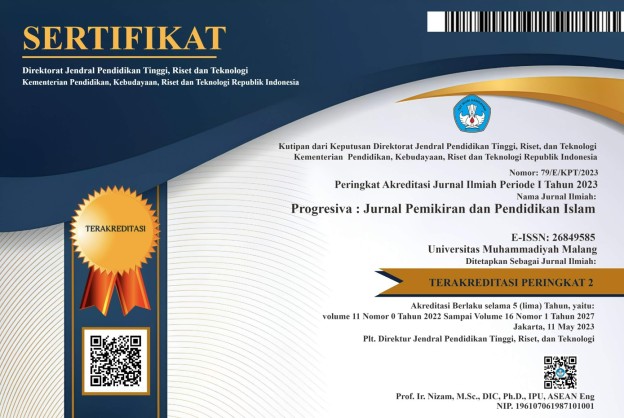The Concept of Education Based on Exemplary To the Prophet Muhammad PBUH: Perspective Muhammad Ibn Abdul Wahab
DOI:
https://doi.org/10.22219/progresiva.v10i1.15676Keywords:
Education, Exemplary, Muhammad bin ‘Abdul WahhabAbstract
This study examines the concept of education in the perspective of Muhammad Ibn’ Abd al-Wahhāb, which is based on his exemplary to the Prophet Muhammad S{allallahu’ alaihi wa Sallam. The da’wah of Ibn’ Abd al-Wahhāb raises the pros and cons among Muslims. The issue of education and exemplary is fundamental in Islam, because for a Muslim, the Prophet Muhammad S{allallahu’ alaihi wa Sallam is the first figure to be followed by his words, carried out his orders and decisions and his behaviour imitated or emulated. This research answers how the concept of education, according to Shaykh Muhammad bin ‘Abdul Wahhāb which is taken from the figure of the Prophet S{allallahu’ alaihi wa Sallam.
The type of research that the writer uses is library research which specifically examines a problem to obtain data in this study’s writing. Sources of data in this study were obtained from primary data and secondary data. The primary sources in this writing are the original works or writings of Shaykh Muhammad bin ‘Abdul Wahha>b. The secondary sources in this study are educational books, journals of morality aqidah in Islam that are relevant to the research discussion. The approach used in this research is historical-philosophical. The data obtained were then analysed by content analysis (content analysis).
This research resulted in understanding the concept of Shaykh Muhammad bin ‘Abdul Wahhāb about education that is in accordance with the salaf manhaj, namely ittiba’ ‘(imitating) the Prophet and based on al-Qur’a>n and Hadith. This study also explains that Shaykh Ibn’ Abd al-Wahhāb carries out and teaches the concept of education in accordance with the teachings of the Prophet S{allallahu’ alaihi wa Sallam. The method of delivering da’wah, thoughts and examples of the behaviour of Shaykh Muhammad bin ‘Abdul Wahha>b is based on exemplary education to the Prophet with all its purity without subtracting or any addition out from it, as well as staying away from all prohibitions in the form of bid’ah, khurafat and things that deviate from Islamic teachings.
Downloads
References
Abu Tami, Ahmad Ibn Ḥajar. Shaykh Muhammad Ibn ‘Abd al-Wahhab ‘Aqidatuhu al-Salafiyyah wa Da’watuhu alIslahiyyah wa Thana’ al-Ulama’ ‘Alayh. Makkah: Darah Malik ‘Abd al-‘Aziz, 1999.
Al-Ahl, ‘Abd al-‘Aziz. Da’iyah alTawhid, Muhammad Ibn ‘Abd al-Wahhab. Beirut: Dar al-‘Ilmi li al-Malayin, 1978.
Al-Bassam, Abdullah Ibn ‘Abdurrahman Ibn Ṣalih.‘Ulama Najd Khilala Sittatu Qurun, vol. 1, cet. 1. Makkah: Mat ba’ah al-Nahda ah al-Ḥadithah, 1398 H.
Al-Nahlawi, Abdurrahman, Pendidikan Islam di Rumah, Sekolah, dan Masyarakat. Jakarta: Gema Insani Press, 1995.
Al-Shibl, ‘Abdullah Yusuf. Muhadarat fi Tarikh al-Dawlah al-Sa’udiyyah. Saudi: Jami’at al-Imam Muhammad Ibn Sa’ud, 1408 H.
Al-Wahhab, Ibn ‘Abd. al-Rasa’il al-Shakhsiyyah dalam Mu’allafat al-Shaykh, vol. 6, 1998.
Bin Baz, ‘Abd al-‘Aziz. Imam Muhammad bin ‘Abd al-Wahhab, Dakwah dan Jejak Perjuangannya, terj. Rahmat al-‘Arifin. Jakarta: Atase Agama di Jakarta, 1419 H.
_________________, Muhammad Ibn ‘Abd al-Wahhab Da’watuhu wa Siratuh. Saudi: Dar al-Sa’udiyyah.
Bishr, Uthmān Ibn ‘Abdillāh Ibn. ‘Unwānu al-Majd fi Tarīkh al-Najd, Vol.1. Makkah: al-Maktabah al-salafiyyah, 1349 H.
Brydges, Sir Harford Jones. A Brief History of the Wahhāby, Ta’rīb ‘Uwaydah al-Juhani. Dārah al-Malik ‘Abd al-‘Azīz, 2005.
Darniqah, Muhammad Ahmad. Shaykh Muhammad bin ‘Abd al-Wahhāb Rā’id al-Da’wah alSalafiyyah fi al-Asri al-Hadīth. al-Dār al-‘Arabiyyah li al-Mausū’āt, 2008.
Ghannām, Ḥusayn Ibn. Rauḍatu al-Afkār wa al-Afhām li Murtadi Hal al-Imam wa Ti’dadi Ghazawāti al-Islām, (Tārīkh Nejed), Vol.1. Mesir: Matba‘ah Madani, 1381 H.
Haris, Ainul. Pemikiran Muhammad Ibn ‘Abd al-Wahhab Tentang Kenabian. Surabaya: Desertasi UIN Sunan Ampel, 2012.
Hariyati, Nik. Pengembangan Kurikulum Pendidikan Islam. Bandung: Alfabeta, 2011.
Hidayat, Rahmat. Muhammad Saw The Super Teacher. Jakarta: Zaytuna Ufuk Abadi, 2015.
Mutawwa’ (al), ‘Abdullāh Ibn Muhammad Ibn ‘Abd al-Muhsin. al-Da’wah al-Islāhiyyah fī Bilādi Najd ‘Alā Yadi al-Imām al-Mujaddid al-Shaykh Muhammad Ibn ‘Abd alWahhāb wa A’lāmuhā Min Ba’dih. Riyād: Dār al-Tadammuriyyah, 2010.
Nadawi (al), Mas’ūd. Muhammad Ibn ‘Abd al-Wahhāb, Muss lihlun Maznlūm wa Muftarā ‘Alayh. Wizārah al-Shu’ūn al-Islāmiyyah wa al-Awqāf wa al-Da’wah wa al-Irshād, 1420 H.
___________,Muhammad Ibn ‘Abd al-Wahhab.
Nata, Abudin. Filsafat Pendidkan Islam. Jakarta: Logos Wacana Ilmu, 1997.
Putri, Febriyanti. Untirta Banten, https://spiritnews.co.id/2018/10/23/pentingnya-pendidikan-formal-informal-dan-non-formal-dalam-mewujudkan-generasi-emas, diakses 20 September 2020.
Ridha, Muhammad Rashīd. Tārīkh al-Imam Muhammad ‘Abduh. Vol.1. Matba’ah al-Manār, 1350 H.
Sadiq, Ḥasan. Judhuru al-Fitnah fi al-Firaq al-Islamiyyah, cet. 3. Kairo: t.p, 1997.
Downloads
Published
How to Cite
Issue
Section
License
Copyright (c) 2021 Ainul Haris

This work is licensed under a Creative Commons Attribution-ShareAlike 4.0 International License.


















